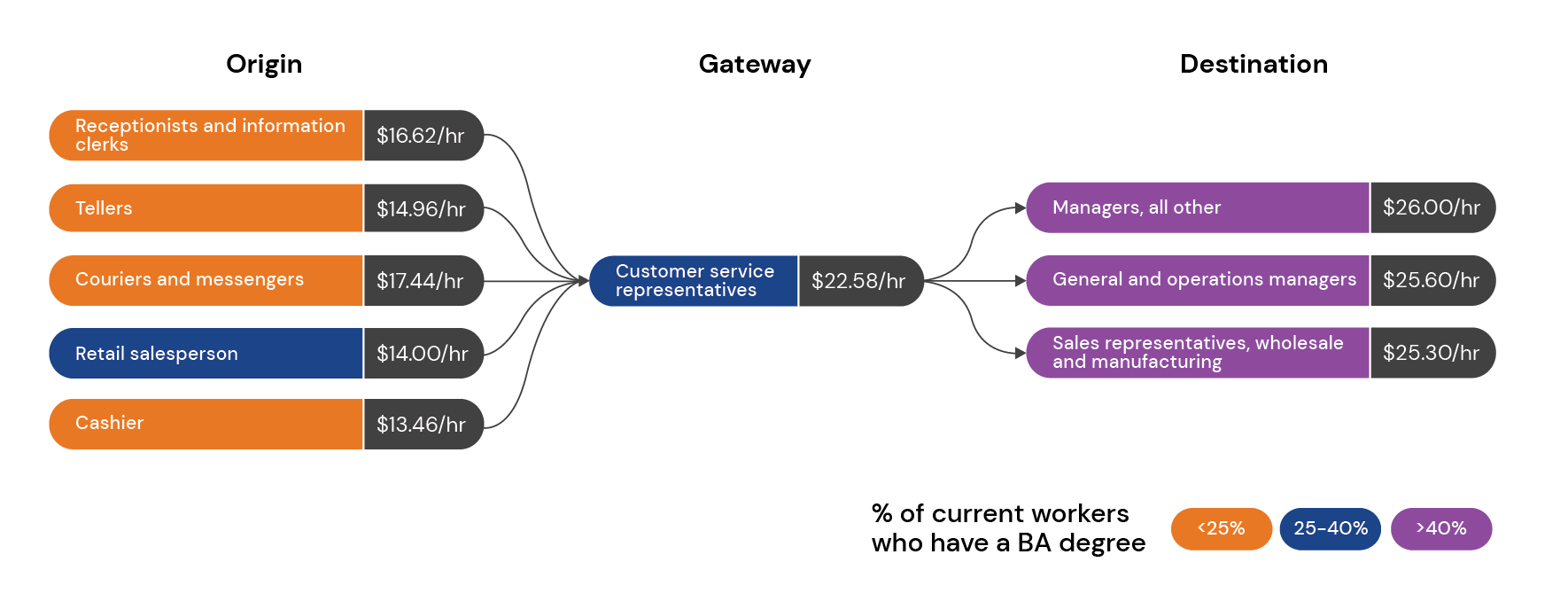Expand skills-based job pathways
A focus on skills can open opportunities for workers and strengthen talent pipelines for employers


Most workers build skills on the job that prepare them for their next role.
Our analyses of the labor market show that all workers routinely move between jobs that require similar skills, making what we call skills-based transitions.

In fact, all workers make these moves over and over again, resulting in well-travelled skills-based pathways, like this one in sales:

There are similar pathways everywhere: in healthcare, IT, business operations, and more. These pathways run within and across industries as workers accumulate in-demand skills at work.
This is true for all workers, but when it comes to STARs — workers Skilled Through Alternative Routes — their job pathways are often blocked by degree requirements that have nothing to do with their skills.
STARs earn skills in many ways, including community college, tech bootcamps, military service, apprenticeships, and other workforce training programs.
No matter where a worker initially earns their skills, those skills count. Those, and the ones they continue to build on the job, qualify all workers to move up.
STARs, more than their counterparts with bachelor’s degrees, rely on skills-based transitions to achieve mobility.

Unfortunately, STARs encounter a paper ceiling at every turn as they seek to advance in the workforce
Overlooked:
Not that long ago, STARs provided employers with a reliable pipeline of skilled talent. In exchange, companies provided a pathway to upward economic mobility for STARs. Together, STARs and companies built a thriving economy where both sides prospered.
Excluded:
Over the past 20 years however, STARs have been denied access to almost 7.4 million middle- and high-wage jobs that used to be open to them.
Blocked:
The barriers that make up the paper ceiling — unnecessary degree screens, biased algorithms, lack of professional networks, and others — prevent STARs from moving up.
Tear the Paper Ceiling with Skills-Based Hiring
See how a shift in college degree requirements has contributed to the displacement of STARs, who make up half of the U.S. workforce.
We need to open skills-based pathways back up
We have identified 30 jobs that have historically provided mobility to STARs. If employers intentionally sourced and hired STARs into these positions, STARs could resume upwardly mobile pathways.

Focus on specific jobs
Employers can identify common skills-based pathways within and across industries, analyze existing barriers, and improve their talent and outreach practices to expand these pathways.

Focus on industries
All local employers share talent with other employers in their geography. In Atlanta, retail and healthcare employers position low-wage workers for middle- and high-wage jobs in other sectors.

Focus on a region


Over 30 million STARs are ready to travel these skills-based pathways today
By strengthening skills-based pathways, we can open opportunities for mobility and grow our collective talent pool.
Our Solutions
STARs Research and Data
Our analytical and research capabilities inform the nation’s understanding of STARs' potential and uncover insights that show how to make positive economic change within regions and industries.
STARs Talent Category Narrative
We reverse misperceptions and correct the narrative about STARs and their skills through public advocacy, including our national advertising campaign, “Tear the Paper Ceiling.”
STAR-Inclusive Tech Tools
We scale skills-first solutions with our talent tech partners by delivering STARs data and insights – enhanced by generative AI – through our “STARSight” tools and APIs.
STAR-Centered Networks
Opportunity@Work activates multi-sector networks – such as our Tear the Paper Ceiling Coalition and our STARs Public Sector Hub – across public, private, nonprofit, and philanthropic organizations to pilot and mainstream skills-first practices.


Explore our research
Learn about skills-based pathways, degree discrimination, regional labor markets, and more.




